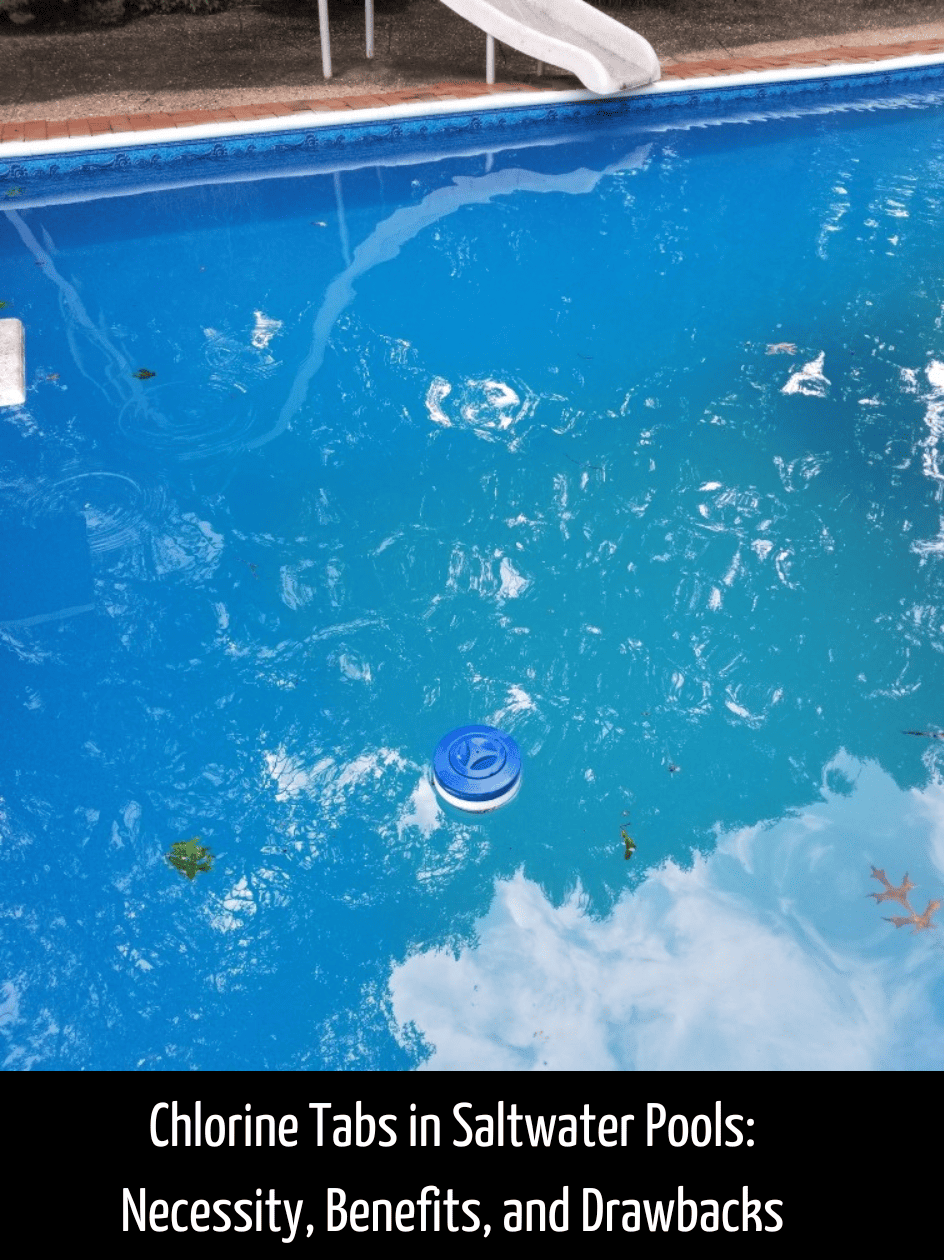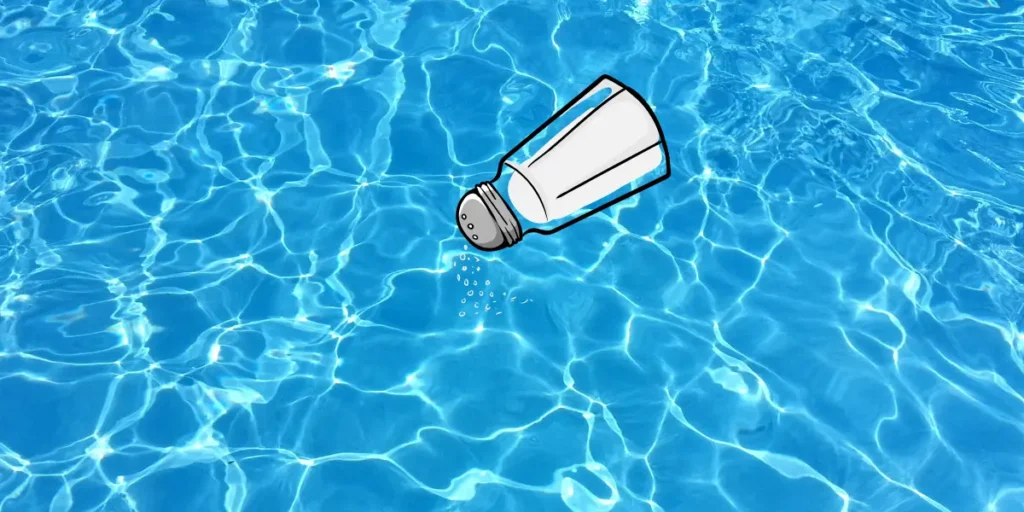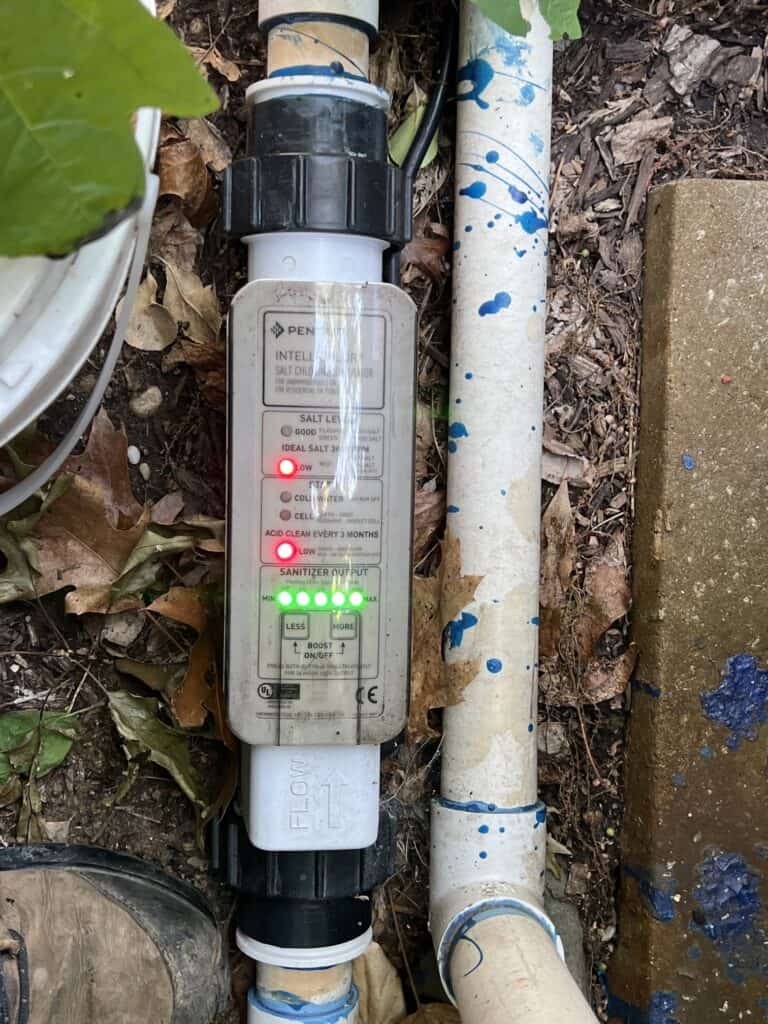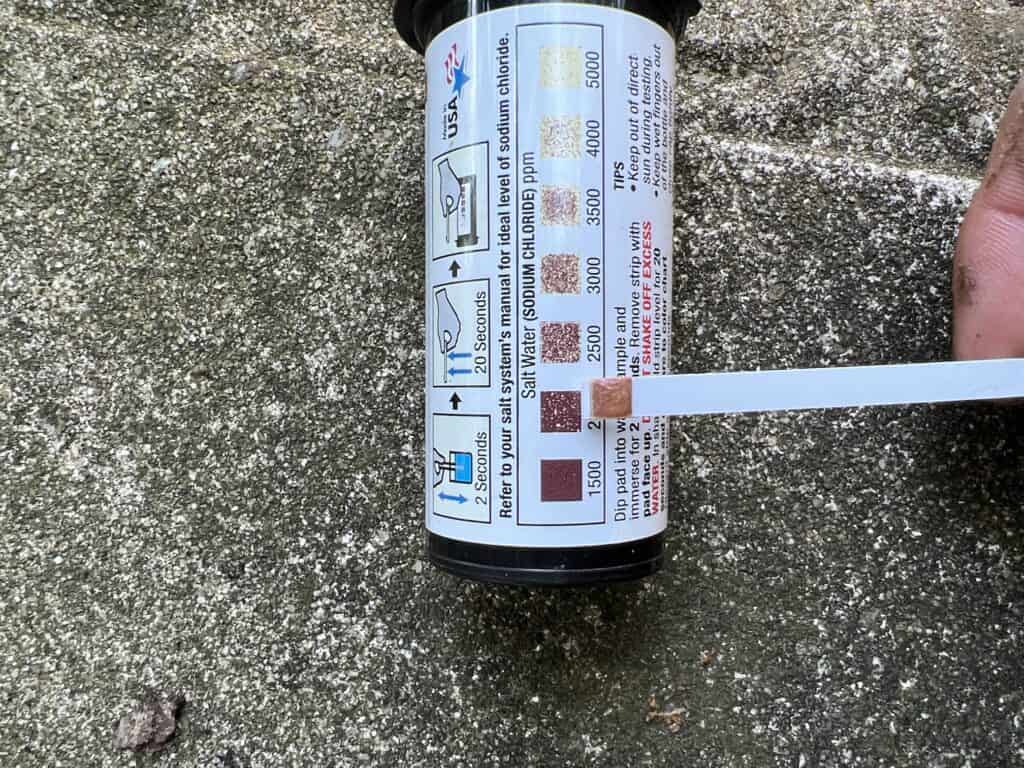
One of the common myths circulating in the pool ownership world is that saltwater pools are entirely chlorine-free. This misconception often leads to surprise when the topic of adding chlorine tabs to saltwater pools arises. How can a pool that’s supposed to be free of chlorine need additional chlorine?
To dispel this misunderstanding, it’s essential to understand that saltwater pools are not devoid of chlorine.
Instead, they produce their own chlorine through electrolysis, where the saltwater pool’s chlorine generator breaks down salt (sodium chloride) into its basic chemical components, one of which is chlorine.

Despite this self-chlorinating process, there are situations where it may be necessary to supplement your saltwater pool with additional chlorine, often in the form of convenient chlorine tabs.
This might seem counterintuitive initially, but as we dive deeper into the subject, you’ll begin to understand the reasoning behind this practice and its potential benefits and drawbacks.
Saltwater pools are popular among pool owners seeking a less harsh, more skin-friendly swimming environment.

But it’s crucial to understand how these pools work to provide the best care for them. At the heart of a saltwater pool system is a process called electrolysis.
The pool’s salt chlorinator, or chlorine generator, applies an electrical charge to the saltwater. This charge breaks down the salt (sodium chloride) molecules, resulting in the production of chlorine.
This newly produced chlorine then works, sanitizing the pool water by killing bacteria and algae, just like in a traditional chlorine pool.
However, there are conditions when more than the naturally generated chlorine may be required.
The efficiency of electrolysis can be affected by several factors, including the pool’s salt level, water temperature, pH, and the overall condition of the chlorine generator.
For instance, colder water temperatures can slow down the chlorine production process.
Similarly, chlorine generation can be hindered if the pool’s salt level falls too low or the water’s pH is out of balance.
Even the best-maintained saltwater pools can experience periods of high usage or weather conditions that place additional demand on the chlorine generator, necessitating supplemental chlorine to maintain a healthy and safe swimming environment.
In the next sections, we’ll delve deeper into the reasons behind supplementing saltwater pools with chlorine tabs and discuss their pros and cons.
As effective as a saltwater pool’s chlorine generator may be, there are times when it might need a little helping hand.
Several scenarios require the addition of supplemental chlorine in the form of chlorine tabs. Here’s when you may require to add chlorine tabs to your saltwater pool:
Like a traditional chlorine pool, a saltwater pool can struggle to keep up with the demands placed upon it after periods of heavy use.
Large groups of swimmers introduce various contaminants to the pool, including sweat, oils, and other organic matter.
These contaminants can deplete the pool’s chlorine levels, reducing sanitizing effectiveness. In such instances, supplemental chlorine can help restore the optimal balance swiftly.
Heavy rainfall can dilute a pool’s salt concentration, impacting the efficiency of the chlorine generator.
Additionally, rainwater often brings various organic and inorganic materials, from leaves and grass to dust and dirt. These materials can consume the pool’s chlorine rapidly.
After a significant rain event, it may be necessary to add chlorine tabs to ensure the pool’s chlorine levels are adequate.
Hot, sunny weather, while ideal for enjoying your pool, can be hard on your pool’s chlorine levels.
The sun’s UV rays can cause chlorine to dissipate faster, and warmer water can lead to faster algae growth.
This combination can strain your chlorine generator, potentially making supplemental chlorine tabs necessary.

The salt cell, or chlorine generator, is the heart of your saltwater pool system.
If it’s not working correctly – it may be aged, damaged, or simply due for a good cleaning – it can’t produce the necessary amount of chlorine.
During such times, until you can address the generator’s issues, chlorine tabs can be an effective stopgap to maintain appropriate chlorine levels.
Recognizing these scenarios is vital for maintaining a healthy, clean, and safe pool environment.
However, while chlorine tabs can be useful, they come with pros and cons that pool owners should be aware of.
Adding chlorine tabs to your saltwater pool might initially seem counterintuitive, but it has several key advantages.

Understanding these benefits can help you make informed decisions about your pool’s maintenance:
When your pool’s chlorine levels drop below the ideal range, chlorine tabs can help restore them quickly. This speedy recovery is crucial to ensure your pool remains clean and safe, especially after heavy pool use or significant weather events.
A well-chlorinated pool is a clean pool. During high usage or warm weather periods, algae and other contaminants can thrive. Supplementing with chlorine tabs can help maintain the necessary sanitization level to prevent these issues, ensuring your pool remains crystal clear.
Consistently burdening your salt cell with high chlorine demands can wear it down over time, shortening its lifespan. Using chlorine tabs during peak periods can reduce this workload, potentially extending the life of the salt cell.
A properly chlorinated pool significantly reduces the risk of waterborne illnesses. Keeping your pool’s chlorine levels within the optimal range, whether through the salt cell or supplemental chlorine tabs, ensures a safer swimming environment for everyone.
While these benefits make a compelling case for using chlorine tabs, it’s also important to understand the potential downsides.
While there are clear benefits to using chlorine tabs as supplements in your saltwater pool, there are also a few potential drawbacks. These are important to be aware of in order to balance your pool maintenance effectively:
One of the challenges of using chlorine tabs is the risk of over-chlorination. While a well-chlorinated pool is desirable, too much chlorine can cause issues such as skin and eye irritation and harm your pool equipment. Therefore, when using chlorine tabs, monitoring your pool’s chlorine levels regularly is crucial to avoid exceeding the recommended range.
Most chlorine tabs contain cyanuric acid, a stabilizer that helps to protect chlorine from the sun’s UV rays. However, repeated and extensive use of these tabs can lead to a build-up of cyanuric acid, which, when at high levels, can actually decrease chlorine’s effectiveness.
While chlorine tabs can serve as a temporary solution when your salt cell is not functioning properly, they’re not meant to replace the cell over the long term. If your salt cell is consistently unable to maintain the correct chlorine levels, it may be time to have it inspected, repaired, or replaced.
The use of chlorine tabs comes with the additional expense of purchasing the tabs themselves and potentially requiring more frequent testing of your pool’s water chemistry. This increases costs and the time you need to spend on pool maintenance.
Balancing these pros and cons is key to deciding when and how to use chlorine tabs in your saltwater pool.
Understanding how to correctly add chlorine tabs to your saltwater pool is crucial. Incorrect application can lead to the issues mentioned earlier, such as over-chlorination or cyanuric acid buildup. Let’s take a step-by-step look at this process:
The first and arguably most important step is to test your pool’s water chemistry. A comprehensive test should reveal your pool’s chlorine levels, pH, alkalinity, and stabilizer (cyanuric acid).

If your chlorine levels are low, and other factors such as the salt cell operation, weather conditions, and pool usage indicate that the pool’s natural chlorine production might be insufficient, it’s time to consider adding chlorine tabs.
Chlorine tabs should always be added to your pool using a chlorine feeder, sometimes called a chlorinator. This device ensures the chlorine dissolves slowly and disperses evenly throughout your pool.
The number of chlorine tabs you need will depend on the size of your pool and the existing chlorine levels. Always follow the manufacturer’s instructions to determine the correct amount.
Furthermore, high stabilizer levels can make it more difficult to maintain the right chlorine levels. You may find that you’re using more and more chlorine to try and achieve the right balance, only to find that your water remains cloudy and unsanitary.
After adding the chlorine tabs, test your pool’s water regularly. This allows you to monitor the chlorine levels and ensure they’re within the ideal range.
If levels are too high or low, you can adjust accordingly by adding more tabs or allowing the levels to lower naturally before adding more.
Remember, supplementing with chlorine tabs should always be the same as regular saltwater pool maintenance.
The tabs are meant to be a temporary solution during periods of heavy usage, poor weather conditions, or when your salt cell might need assistance.
Regular testing of your pool’s water is key to maintaining the optimal balance of chemicals, ensuring a clean, safe swimming environment.
Chlorine tabs aren’t the only solution for boosting chlorine levels in your saltwater pool. Depending on the circumstances, other methods might be more appropriate or effective. Let’s explore a couple of alternative options:
One alternative to using chlorine tabs is shock treatment. This involves adding a large amount of chlorine (or a non-chlorine substitute) to your pool to quickly increase the chlorine levels.
This can be particularly useful after heavy pool usage, a period of hot weather, or a rainstorm, which can rapidly deplete your pool’s chlorine.
However, remember that a shock treatment is a quick fix rather than a long-term solution.
If your saltwater pool consistently struggles to maintain proper chlorine levels, it could indicate a problem with your salt cell. Instead of continuously supplementing with chlorine tabs, inspecting, cleaning, or replacing your salt cell may be more effective.
This can enhance your pool’s natural chlorine production and minimize the need for additional chlorine.
It’s important to remember that all these options, including chlorine tabs, have their place in pool maintenance. It all comes down to understanding your pool, monitoring the water chemistry, and choosing the right solution for the circumstances.
Regular consultation with a pool service professional like us can help you navigate these decisions and keep your pool in optimal condition.
To recap, while saltwater pools do generate their own chlorine, there are certain scenarios where this natural process may not suffice. High usage, heavy rainfall, periods of hot weather, or issues with the pool’s salt cell can all cause a drop in chlorine levels. Supplementing with chlorine tabs can quickly and effectively solve these problems, rapidly restoring chlorine levels to maintain a safe, clean swimming environment.
However, it’s important to understand that chlorine tabs are not a cure-all. They are just one tool in a pool owner’s maintenance kit. Relying on them too heavily or without proper monitoring can lead to problems like over-chlorination or cyanuric acid buildup. Furthermore, they aren’t a long-term solution for a malfunctioning salt cell.
Alternatives to chlorine tabs, such as shock treatments or salt cell maintenance/replacement, can also effectively manage chlorine levels. Remember, the key to successful pool maintenance is regular testing and monitoring your pool’s water chemistry.
If you are experiencing issues with your salt system or are unsure about the chlorine levels in your pool, feel free to reach out.
Our experienced pool service professionals are ready to help. You can book a troubleshooting service with us, and we’ll ensure your pool is healthy, safe, and ready for you to enjoy.
(We’re running a special discount of $50 on our troubleshooting visit for a limited time)

We make pool ownership easy with stress-free maintenance, expert repairs, and cutting-edge tech. From sparkling water to pool automation, we handle every detail so you can relax and enjoy your pool.
© 2025 Paul Romanelli & Son Pool Service.